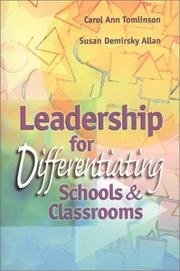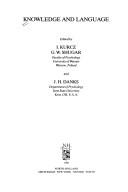| Listing 1 - 4 of 4 |
Sort by
|

ISBN: 9780871205025 0871205025 1280931078 1416601023 0871209233 9786610931071 0871207249 9780871207241 9781416601029 9781280931079 1416612475 Year: 2000 Publisher: Alexandria, Va. : Association for Supervision and Curriculum Development,
Abstract | Keywords | Export | Availability | Bookmark
 Loading...
Loading...Choose an application
- Reference Manager
- EndNote
- RefWorks (Direct export to RefWorks)
Try going a week without hearing a call for a massive overhaul of our educational system. Parents, students, educators, bureaucrats, pundits . . . everyone says something must be done. But what? And who should do it?In this environment, school leaders must build bridges for change. As the system now stands, many students spend great portions of their lives feeling inferior if they struggle, invisible if they already know the material, problematic if they're not a child of the dominant culture, and perverse if they question the school agenda.This book explores how school leaders can develop responsive, personalized, and differentiated classrooms. Differentiation is simply a teacher attending to the learning needs of a particular student or small group of students, rather than teaching a class as though all individuals in it were basically alike.Expert educators teach individuals the most important things in the most effective ways. No single approach works with all students. Classrooms function best when teachers and students join to develop multiple avenues to learning. Until every student is growing and successful, our own growth is unfinished. The authors show how school leaders can encourage and support growth in our classrooms.
Individualized instruction. --- Cognitive styles in children --- Educational leadership. --- Classroom management. --- School environment. --- Enseignement individualisé --- Styles cognitifs chez l'enfant --- Leadership en éducation --- Classes (Education) --- Milieu scolaire --- Conduite --- Differentiation (Education) --- Individual instruction --- Tutors and tutoring --- Individualized education programs --- Mastery learning --- Open plan schools --- Environment, School --- Educational sociology --- School discipline --- School management and organization --- Teaching --- College leadership --- Education leadership --- School leadership --- Leadership
Book
ISBN: 0127424601 1483297675 9780127424606 Year: 1988 Publisher: San Diego, Calif. Academic Press
Abstract | Keywords | Export | Availability | Bookmark
 Loading...
Loading...Choose an application
- Reference Manager
- EndNote
- RefWorks (Direct export to RefWorks)
This volume reflects current research on the cognitive strategies of autonomous learning. Topics such as metacognition, attribution theory, self-efficacy, direct instruction, attention, and problem solving are discussed by leading researchers in learning and study strategies. The contributors to this volume acknowledge and address the concerns of educators at the primary, secondary, and postsecondary school levels. The blend of theory and practice is an important feature of this volume.
Didactics --- Learning --- Study skills --- Cognitive styles --- Individualized instruction --- Apprentissage --- Etude --- Styles cognitifs --- Enseignement individualisé --- Congresses --- Congrès --- Méthodes --- -Individualized instruction --- -Learning --- -Study skills --- -How to study --- Learning, Art of --- Method of study --- Study, Method of --- Study methods --- Life skills --- Learning process --- Comprehension --- Education --- Differentiation (Education) --- Individual instruction --- Tutors and tutoring --- Individualized education programs --- Mastery learning --- Open plan schools --- Styles, Cognitive --- Cognition --- Intellect --- Personality and cognition --- -Congresses --- Enseignement individualisé --- Congrès --- Méthodes --- How to study --- Cognitive styles - Congresses --- Individualized instruction - Congresses --- Study skills - Congresses --- Learning - Congresses

ISBN: 1280611480 9786610611485 1402040148 140204013X 9781402040139 9781402040146 9048170125 Year: 2005 Volume: 19 Publisher: Dordrecht Springer
Abstract | Keywords | Export | Availability | Bookmark
 Loading...
Loading...Choose an application
- Reference Manager
- EndNote
- RefWorks (Direct export to RefWorks)
New Directions in Cognitive Information Retrieval presents an exciting new direction for research into cognitive oriented information retrieval (IR) research, a direction based on an analysis of the user’s problem situation and cognitive behavior when using the IR system. This contrasts with the current dominant IR research paradigm which concentrates on improving IR system matching performance. The chapters describe the leading edge concepts and models of cognitive IR that explore the nexus between human cognition, information and the social conditions that drive humans to seek information using IR systems. Chapter topics include: Polyrepresentation, cognitive overlap and the boomerang effect, Multitasking while conducting the search, Knowledge Diagram Visualizations of the topic space to facilitate user assimilation of information, Task, relevance, selection state, knowledge need and knowledge behavior, search training built into the search, children’s collaboration for school projects, and other cognitive perspectives on IR concepts and issues.
Information retrieval. --- Information behavior. --- Cognitive styles. --- Human-computer interaction. --- Information storage and retrieval systems. --- Styles, Cognitive --- Cognition --- Intellect --- Personality and cognition --- Information-seeking behavior --- Human behavior --- Data retrieval --- Data storage --- Discovery, Information --- Information discovery --- Information storage and retrieval --- Retrieval of information --- Documentation --- Information science --- Information storage and retrieval systems --- Automatic data storage --- Automatic information retrieval --- Automation in documentation --- Computer-based information systems --- Data processing systems --- Data storage and retrieval systems --- Discovery systems, Information --- Information discovery systems --- Information processing systems --- Information retrieval systems --- Machine data storage and retrieval --- Mechanized information storage and retrieval systems --- Computer systems --- Electronic information resources --- Data libraries --- Digital libraries --- Information organization --- Information retrieval --- Computer-human interaction --- Human factors in computing systems --- Interaction, Human-computer --- Human engineering --- User-centered system design --- User interfaces (Computer systems) --- Comportement dans la recherche de l'information. --- Interaction homme-machine (Informatique). --- Recherche de l'information. --- Styles cognitifs. --- Systèmes d'information. --- Information Technology --- Computer Science (Hardware & Networks) --- Computer science. --- Human Geography. --- Library science. --- Social sciences. --- Consciousness. --- Computer Science, general. --- Library Science. --- Social Sciences, general. --- Personality and Social Psychology. --- Apperception --- Mind and body --- Perception --- Philosophy --- Psychology --- Spirit --- Self --- Behavioral sciences --- Human sciences --- Sciences, Social --- Social science --- Social studies --- Civilization --- Librarianship --- Library economy --- Bibliography --- Anthropo-geography --- Anthropogeography --- Geographical distribution of humans --- Social geography --- Anthropology --- Geography --- Human ecology --- Informatics --- Science --- Human geography. --- Personality. --- Social psychology. --- Personal identity --- Personality psychology --- Personality theory --- Personality traits --- Personology --- Traits, Personality --- Individuality --- Persons --- Temperament --- Mass psychology --- Psychology, Social --- Social groups --- Sociology

ISBN: 0444700668 9780080866932 008086693X 9780444700667 1282617826 9781282617827 9786612617829 6612617829 Year: 1986 Volume: 39 Publisher: Amsterdam ; New York : New York, N.Y. : North-Holland ; Sole distributors for the U.S.A. and Canada, Elsevier Science Pub. Co.,
Abstract | Keywords | Export | Availability | Bookmark
 Loading...
Loading...Choose an application
- Reference Manager
- EndNote
- RefWorks (Direct export to RefWorks)
How do people represent their knowledge about the world and use that knowledge for communication? This question is the central theme of this book. Among the aspects discussed in the first three sections are: the relationship between formal, logical descriptions of language, and psychological analyses of language use; how knowledge interacts with language use; and childrens' acquisition of language in different countries. In the last two sections, the topics discussed include the complex relationships between the development, transmission, and comprehension of intention and meaning
Cognitive psychology --- Lexicology. Semantics --- Psycholinguistics --- Language acquisition --- Cognition --- Psycholinguistique --- Langage --- Congresses --- Congrès --- Acquisition --- Psycholinguistique. --- Cognition. --- Psycholinguistics. --- Language acquisition. --- Psychology --- Acquisition of language --- Developmental linguistics --- Developmental psycholinguistics --- Language and languages --- Language development in children --- Psycholinguistics, Developmental --- Interpersonal communication in children --- Language, Psychology of --- Psychology of language --- Speech --- Linguistics --- Thought and thinking --- Connaissance --- Cinéma --- Philosophie de l'esprit --- Dieu --- Thérapie cognitive --- Théorie de la connaissance --- Psychologie cognitive --- Sciences cognitives --- Distracteurs (psychologie) --- Cognition distribuée --- Énaction --- Écriture --- Lecture --- Pensée --- Attention --- Savoir-faire --- Fonctions exécutives (neuropsychologie) --- Abstraction --- Catégorisation (psychologie) --- Cognition et culture --- Compréhension --- Conservation (psychologie) --- Dissonance cognitive --- Traitement de l'information chez l'homme --- Nombre, Idée de --- Perception --- Perception des structures --- Styles cognitifs --- Cartes cognitives --- Schèmes (psychologie) --- Métacognition --- Constructivisme (psychologie) --- Intuition --- Psychologie --- Apprentissage verbal --- Enfants --- Langue maternelle, Acquisition de la --- (linguistique) --- Langues --- Parole --- Psychologie du langage --- Biolinguistique --- Neurolinguistique --- Psychanalyse et langage --- Attitudes linguistiques --- Compétence de communication (linguistique) --- Compétence et performance (linguistique) --- Conscience linguistique --- Contrôle (linguistique) --- Créativité (linguistique) --- Différenciateur sémantique --- Discours intérieur --- Langage et émotions --- Linguistique cognitive --- Perception de la parole --- Psychophonétique --- Saillance linguistique --- Son --- Tabous linguistiques --- Tests linguistiques --- Troubles du langage --- Linguistique --- Acquisition. --- Psychological aspects --- Aspect cognitif --- Cognoscibilité --- Tests --- Langage -- Acquisition --- Apprentissage --- Aspect psychologique --- Différences entre sexes --- Aspect symbolique --- Acquisition linguistique --- Innéisme (linguistique) --- Reconnaissance des mots --- Psychologie de l'apprentissage --- Language Development --- Psycholinguistic --- Language Acquisition --- Acquisition, Language --- Development, Language --- Cognitive Function --- Cognitions --- Cognitive Functions --- Function, Cognitive --- Functions, Cognitive --- Submorphologie --- Sériation (psychologie) --- Prospection épisodique --- Traitement de l'information (psychologie) --- Amorçage syntaxique --- Acquisition du langage --- Psychologie de la lecture
| Listing 1 - 4 of 4 |
Sort by
|

 Search
Search Feedback
Feedback About UniCat
About UniCat  Help
Help News
News